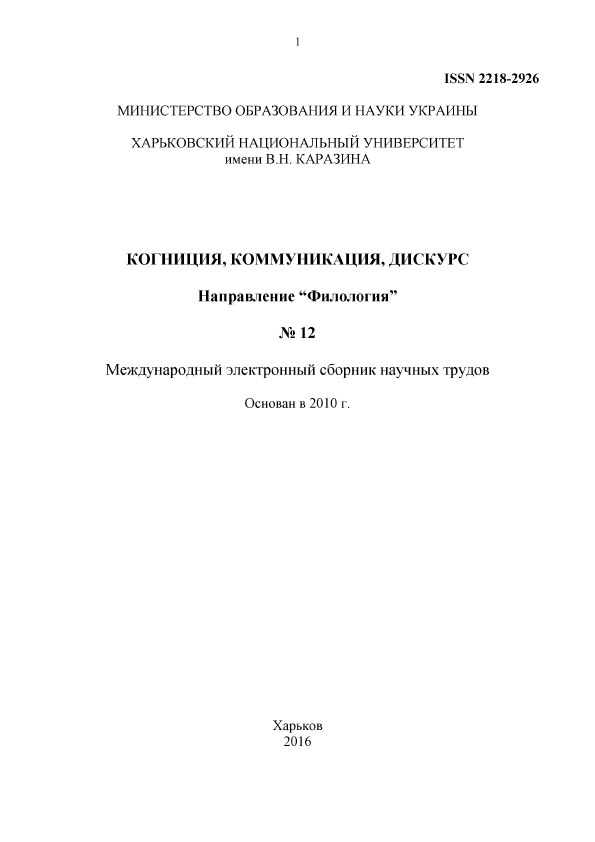Artistic conceptualization and cognitive variation
Abstract
It is presented cognitive approach for poetic text analysis in the article, in terms of which features of knowledge conceptualizing in artistic creation are considered. The term "artistic concept" is specified and its difference from artistic image is examined. Artistic concept as a mental unit of knowledge is characterized with the set of components. Level classification of artistic concepts is created which is based on analysis of components. It allows displaying contact between consciousness and language. Classification includes concepts which were formed at different levels of the text. There are: Sound-rhythmic concepts; Subject concepts, Process-Relative concept; Event Concept, Impression Concept, Iconic concepts. Artistic concepts form the system which determines the limit of cognitive variation. Cognitive variation makes effective artistic interpretation possible in diversity of artistic linguistic forms. In the process of conceptualizing of artistic and aesthetic experience metaphoric models, in a greater degree, organize the conceptual level, metonymical – linguistic level.
Downloads
References
Boldyrev, N.N. (2009). Kontseptual'naya osnova yazyka [Conceptual base of the language]. In: Kognitivnye issledovaniya yazyka: T. IV. Kontseptualizatsiya mira v yazyke [Cognitive linguistic research: Vol. IV. Conceptualisation of the world in language] (pp. 25–77). Tambov: Izdatelstvo TGU imeni G.R. Derzhavina Publ.
Chikina, E.E. (2006). Tekstoobrazuyushchie funktsii yazykovogo ritma v aspekte kongitivnoy lingvistiki [Text-forming function of language rhythm in the aspect of cognitive linguistics]. Chelovek i yazyk v polikul'turnom mire: Doklady i tezisy dokladov na mezhd. nauch. konf., 2006, Vladimir. [Man and language in the polycultural world: reports and abstracts of the int. sci. conf., 2006, Vladimir]. Vladimir, 51–58 (in Russian).
Gehlmann, L., & Bowman, M.R. (1958). Adventures in American Literature. New York, Chicago: Harcourt, Brace and company.
Losev, L.V. (2006). Iosif Brodskiy: Opyt literaturnoy biografii [Joseph Brodsky: Experience of literary biography]. M.: Molodaya gvardiya Publ.
Maslova, Zh.N. (2010). Poeticheskaya kartina mira i ee reprezentatsiya v yazyke [Poetic picture of the world and its representation in the language]. Tambov: TGU im. G.R. Derzhavina Publ.
Maslova, Zh.N., & Minakhin, D.V. (2014). Evolyutsionnye etapy razvitiya kognitivnykh mekhanizmov formirovaniya smysla [Evolutionary stages of development of the cognitive mechanisms of sense]. Ekologiya yazyka: sbornik statej VII Mezhdunarodnoj nauchnoj konferencii, 2014 Penza. [Language ecology: Proc. 7th Int. Conf. 2014, Penza]. Penza, 66–71 (in Russian).
Miller, L.V. (2000). Khudozhestvennyy kontsept kak smyslovaya i esteticheskaya kategoriya [Artistic concept as conceptual and aesthetic category]. Mir russkogo slova. – The World of Russian Word, 4, 39–45 (in Russian).
Pavilenis, R.I. (1983). Problema smysla. Sovremennyy logiko-filosofskiy analiz yazyka [The problem of meaning. Modern logical and philosophical analysis of language]. M.: Mysl' Publ.
Pavlovich, N.V. (1991). Paradigmy obrazov v russkom poeticheskom yazyke [Paradigms of images in the Russian poetic language]. Voprosy yazykoznaniya. – Issues in Linguistics, 3, 104–117.
Pavlovich, N.V. (1999) Slovar' poeticheskikh obrazov [Poetic Images Dictionary]. M.: Editorial URSS Publ.
Pavlovskaya, I.Yu. (2004). Fonosemanticheskiy analiz rechi [Phonosemantic analysis of speech]. SPb.: izd-vo SPb. un-ta Publ.
Tarasova, I.A. (2012). Poeticheskiy idiostil' v kognitivnom aspekte [Poetic idiostyle in the cognitive aspect]. M.: FLINTA Publ.
Voronin, S.V. (1982). Osnovy fonosemantiki [Principles of sound symbolism]. L.: Izd-vo Leningradskogo un-ta Publ.
Authors, who publish with this journal, accept the following conditions:
The authors reserve the copyright of their work and transfer to the journal the right of the first publication of this work under the terms of the Creative Commons Attribution License (CC BY), which allows other persons to freely distribute a published work with mandatory reference to the authors of the original work and the first publication of the work in this journal.
Authors have the right to enter into separate additional agreements for the non-exclusive dissemination of the work in the form in which it was published by this journal (for example, to post the work in the electronic institutions' repository or to publish as part of a monograph), provided that the link to the first publication of the work in this journal is given.
The journal policy allows and encourages the authors to place the manuscripts on the Internet (for example, in the institutions' repositories or on personal websites), both before the presentation of this manuscript to the editorial board and during review procedure, as it contributes to the creation of productive scientific discussion and positively affects the efficiency and dynamics of citing the published work (see The Effect of Open Access).




